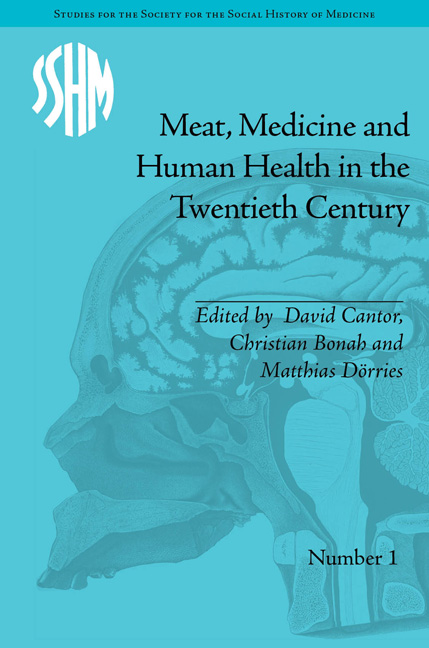Book contents
- Frontmatter
- CONTENTS
- Acknowledgements
- List of Contributors
- List of Figures and Tables
- Introduction
- Part 1 Meat and Therapeutics
- Part II Meat, Politics and Culture
- 4 What's Meatpacking got to do with Worker and Community Health?
- 5 Is Refrigerated Meat Healthy? Mexico Encounters the Chicago Meatpacking ‘Jungle’, c. 1910
- 6 Confused Messages: Meat, Civilization, and Cancer Education in the Early Twentieth Century
- 7 What's for Dinner? Science and the Ideology of Meat in Twentieth-Century US Culture
- 8 Vegetarianism, Meat and Life Reform in Early Twentieth-Century Germany and their Fate in the ‘Third Reich’
- Part III Meat, Risk and Regulation
- Notes
- Index
6 - Confused Messages: Meat, Civilization, and Cancer Education in the Early Twentieth Century
from Part II - Meat, Politics and Culture
- Frontmatter
- CONTENTS
- Acknowledgements
- List of Contributors
- List of Figures and Tables
- Introduction
- Part 1 Meat and Therapeutics
- Part II Meat, Politics and Culture
- 4 What's Meatpacking got to do with Worker and Community Health?
- 5 Is Refrigerated Meat Healthy? Mexico Encounters the Chicago Meatpacking ‘Jungle’, c. 1910
- 6 Confused Messages: Meat, Civilization, and Cancer Education in the Early Twentieth Century
- 7 What's for Dinner? Science and the Ideology of Meat in Twentieth-Century US Culture
- 8 Vegetarianism, Meat and Life Reform in Early Twentieth-Century Germany and their Fate in the ‘Third Reich’
- Part III Meat, Risk and Regulation
- Notes
- Index
Summary
Writing in The Natural History of Cancer (1908), the British medical practitioner William Roger Williams adduced what he called ‘overwhelming evidence … that the incidence of cancer is largely conditioned by nutrition’. In his experience most of those affected with the disease in the early stages were ‘large, robust, well-nourished, florid persons, who appear[ed] to be overflowing with vitality’, whereas ‘the small, pale, [and] ill-nourished’ seldom fell victim to the disease. No factor, he claimed, was more likely to promote cancer than excessive feeding. Cancer was a rejuvenescence most likely to occur when there had been sudden or violent change in the environment, especially from poverty and want to riches and plenty. It was particularly associated with ‘the gluttonous consumption of proteids – especially meat’.
Williams's views capture several themes that recur in early twentieth-century discourses on diet and cancer on both sides of the Atlantic: that cancer was a disease of civilization, of excess, of nutrition and, for many, of meat. The implications for cancer control were clear. If individuals modified their diet, they might reduce their risk of cancer, and perhaps stem the growth of cancers already established in the body: dietary modification might also help them through the trauma of surgery and other treatments. But, if Williams or the many other writers on this subject hoped that cancer campaigns would encourage the public to change their meat consumption, they were to be disappointed.
- Type
- Chapter
- Information
- Meat, Medicine and Human Health in the Twentieth Century , pp. 111 - 126Publisher: Pickering & ChattoFirst published in: 2014



